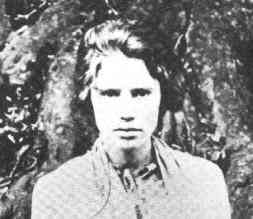



In recent years, the Appalachian lament "I Am a Man of Constant Sorrow" has become popular in urban folksong circles, in part through the performance of the Stanley Brothers and of Mike Seeger. No study of this haunting piece is available; the earliest text I have found was printed about 1913 in a pocket songster hawked by Dick Burnett, a blind singer from Monticello, Kentucky. During 1918, Cecil Sharp collected the song and published it as "In Old Virginny" (Sharp II, 233). Sarah's recomposition of the traditional "Man" into a more personal "Girl" took place about 1936 in New York, where her first husband, Andrew Ogan, was fatally ill. The text was descriptive of loneliness away from home and anticipated her bereavement; the melody she remembered from a 78 rpm hillbilly record (Emry Arthur) [probably Vocalion Vo 5208, 1928] she had heard some years before in the mountains.


I am a girl of constant sorrow,
I've seen trouble all my days.
I bid farewell to old Kentucky,
The state where I was born and raised.My mother, how I hated to leave her,
Mother dear who now is dead.
But I had to go and leave her
So my children could have bread.Perhaps, dear friends, you are wonderin'
What the miners eat and wear.
This question I will try to answer,
For I'm sure that it is fair.For breakfast we had bulldog gravy,
For supper we had beans and bread.
The miners don't have any dinner,
And a tick of straw they call a bed.Well, we call this hell on earth, friends,
I must tell you all goodbye.
Oh, I know you all are hungry,
Oh, my darlin' friends, don't cry.


